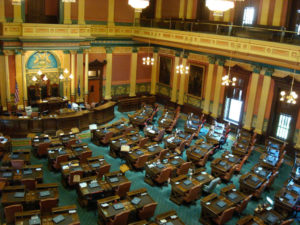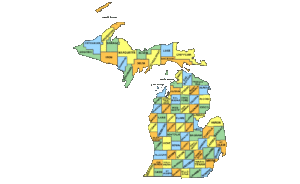Legislative Update 11-8-24
Election means divided government in Lansing in 2025
 The Michigan House of Representatives has experienced a power shift following this week’s election, with Republicans winning enough seats to take control in the upcoming legislative session. Moving from a narrow Democratic majority of 56-54 to a Republican majority of 58-52.
The Michigan House of Representatives has experienced a power shift following this week’s election, with Republicans winning enough seats to take control in the upcoming legislative session. Moving from a narrow Democratic majority of 56-54 to a Republican majority of 58-52.
The shift in control brings changes to the leadership structure in the House. Matt Hall (R-Kalamazoo), the current minority leader, will assume the role of speaker of the House, while Rep. Brian Posthumus (R-Kent) will serve as floor leader. On the Democratic side, outgoing House Speaker Joe Tate has opted not to pursue the minority leadership position; instead, Rep. Ranjeev Puri (D-Wayne) has been elected to lead the Democratic caucus, with Rep. John Fitzgerald (D-Kent) as minority floor leader.
As the current Democratic-led government maintains control of both legislative chambers and the governor’s office for the remainder of the year, the stage is set for a robust lame-duck session. With a Republican-controlled House on the horizon, Democrats are expected to prioritize action on such issues as labor laws and environmental policy that may face greater challenges under the new Republican leadership in 2025.
On the Senate side in Lansing, the election of state Sen. Kristen McDonald-Rivet (D-Bay) to a congressional seat will create a vacancy and narrow the Democratic majority to one (19-18) until a special election can be held to fill her Senate seat. This could potentially complicate efforts to pass certain legislative goals that rely on complete party alignment.
This transition promises a dynamic new legislative term as Michigan’s leaders prepare to navigate the challenges of divided government.
For more information, contact Deena Bosworth at bosworth@micounties.org.
 MAC review finds 22 percent turnover in commissioner ranks
MAC review finds 22 percent turnover in commissioner ranks
There will be at least 135 new faces on county boards of commissioners in Michigan, thanks to the decisions of voters in the Nov. 5 election.
A MAC review of unofficial results from the General Election shows 460 Republicans, 143 Democrats and 12 individuals without partisan affiliation were elected or re-elected. Four seats remain to be filled – one each in Alpena, Iron, Luce and Oscoda.
“The turnover rate of about 22 percent is consistent with prior election cycles,” said MAC Executive Director Stephan Currie. “We are excited to begin work with our new members, and we hope to see them at our upcoming New Commissioner School sessions.” (See item below about registration.)
The commissioners entering their new term for 2025 will be the first in Michigan to serve four years, a result of MAC’s successful campaign in 2021 to extend terms from the two-year limitation that had been in place since 1968.
Counties score well with voters on millage requests
 Voters across Michigan approved nearly 90 percent of the county millage requests placed before them on the Nov. 5 ballot.
Voters across Michigan approved nearly 90 percent of the county millage requests placed before them on the Nov. 5 ballot.
Forty-one of the 46 requests were favored to either renew or expand efforts in areas ranging from public safety and senior services to constructing a new community pool in Bay County.
Click here to see county-by-county results.
“The Nov. 5 election continues a pattern evident since the end of the Great Recession a decade ago in which counties all over the state have sought voter approval to maintain and improve the quality-of-life services counties provide, and the voters have approved,” said Eric Lupher, president of the Citizens Research Council of Michigan. “More than 90 percent of counties will be levying higher property tax rates in 2025 than they were in 2010,” he added. (See more of CRC’s analysis of this trend on page 14 of the February 2022 edition of Michigan Counties magazine.)
MAC appreciates the assistance of the Gongwer News Service in compiling this data.
MAC working with state to address materials management issues
 In recent weeks, MAC has received member concerns about the Materials Management Planning process. At the same time, the Department of Environment, Great Lakes and Energy (EGLE) has set up meetings with stakeholders to discuss potential cleanup language for the statute.
In recent weeks, MAC has received member concerns about the Materials Management Planning process. At the same time, the Department of Environment, Great Lakes and Energy (EGLE) has set up meetings with stakeholders to discuss potential cleanup language for the statute.
It seems that both the department and participating counties have simultaneously encountered bumps in the road during these initial steps in the process. MAC has had many discussions behind the scenes with both EGLE and other stakeholders, so we felt it was necessary to share some updates.
The deadline to file a Notice of Intent with EGLE was July 6, 2024. Counties then have 180 days, or until Jan. 2, 2025, to do all of the following:
- Appoint a Designated Planning Agency (DPA)
- Appoint a Materials Management Planning Committee (MMPC)
- DPA drafts a Work Program
- MMPC approves Work Program
- Work Program is submitted to EGLE
- EGLE approves the Work Program
A county is eligible for grant funding once all of the above tasks have been completed. However, EGLE has yet to share with counties the guidelines for creating a Work Program. MAC has been told extensions may be granted, but that is not explicitly written in the law.
Additionally, MAC has been made aware that some counties are struggling to fill the 11 spots required for the MMPC. There is currently no mechanism for reducing the size of an MMPC or formally requesting an extension to fill those seats.
MAC is pursuing solutions to these problems, among other things, both in large workgroup settings and in private conversations with the department. The next stakeholder meeting is Nov. 8.
For more information on this issue, contact Madeline Fata at fata@micounties.org.
 |
 |
 |
Michigan counties join Operation Green Light efforts
Counties across Michigan are showing their support for America’s veterans via Operation Green Light, a campaign by the National Association of Counties. MAC is aware of participation in: Chippewa (photo at left), St. Joseph (center photo), Genesee (photo at right), Oakland, Wexford, Midland, Lenawee and Kent. (Click here for a video on Kent’s activities.)
Operation Green Light shows support for veterans by lighting buildings green from Nov. 4-11, 2024, to let veterans know that they are seen, appreciated and supported.
 MAC offices to close for Veterans Day
MAC offices to close for Veterans Day
MAC’s Lansing offices will be closed on Monday, Nov. 11 to observe Veterans Day in honor of those who served, including the nearly 500,000 veterans who now call Michigan home.
Veterans Day, formerly known as Armistice Day, was originally set as a U.S. legal holiday to honor the end of World War I, which officially took place on Nov. 11, 1918. In 1938, through an act of Congress, Nov. 11 was made a legal holiday. In 1954, at the urging of the veterans service organizations, the 83rd U.S. Congress amended the Act of 1938 by striking out the word “Armistice” and inserting the word “Veterans.” On June 1, 1954, November 11th became a day to honor American veterans of all wars.
MAC offices will resume normal hours on Tuesday, Nov. 12 at 8 a.m.
Podcast 83: Fielding your questions on commissioner pay, chair terms
 In a wide-ranging episode recorded the day before the historic 2024 General Election, MAC’s Podcast 83 team addressed questions related to commissioner pay and board elections and reviewed a new MAC advocacy initiative for 2025.
In a wide-ranging episode recorded the day before the historic 2024 General Election, MAC’s Podcast 83 team addressed questions related to commissioner pay and board elections and reviewed a new MAC advocacy initiative for 2025.
In the wake of MAC’s success in getting four-year commissioner terms adopted for this cycle, MAC has been fielding questions on two themes:
- What will change about how commissioner pay is set?
- What will be different about how boards elect chairs and vice chairs?
On pay, Deena Bosworth reported, “We consulted legal counsel and had them do some work on it. And the response was, compensation for county commissioners has to be determined prior to the start of the new term. So now that they have four-year terms, they have to adopt their compensation prior to the end of this year, so prior to Dec. 31 2024, so that they know what their compensation is for this next term.
“They can’t change their compensation or, you know, vote on new compensation in January after they take office, so whoever is on the board now needs to determine what that compensation level is going to be going forward for the next term.”
On chairs and vice chairs, Bosworth explained, “The legislation that was adopted creating four-year terms for county commissioners … was done as a certain section of law. The other (relevant) sections of law have not been amended. So, what that means is, just as your process is now, you have to vote for a chair for a two-year term, unless your board has a resolution where you adopt a chair for a one-year cycle, and then one year cycle for your vice chair. So that, again, has not changed. … So even if you’re there for four years, that chairmanship is still only a two-year term, or one-year depending on your particular board rules.”
In the second half of the episode, Samantha Gibson reviewed MAC’s “CountiesUnited” campaign to launch in 2025 and which was teased at the 2024 Annual Conference in September.
“What we’re looking to provide for you all is not only an opportunity to shape and advance public policy in Lansing that is to the benefit of county government, but also give you some cool personal benefits that you can enjoy,” Gibson said. “You’ll get political updates from MAC’s Governmental Affairs team. … You know, pollsters, political pundits, really cool, interesting stuff that you know, maybe it’s a little inside baseball, but if you’re nerdy and you’re policy wonks like we are, you might get interested in the politics behind all things.
Gibson noted other benefits, keyed to new membership tiers for donating to MAC’s political affairs, will include special merchandise and invites to MAC events for key legislators (the “County Caucus”).
And listen all the way to the end of the episode to get answers on two burning questions:
- Who is the longest-serving county commissioner in Michigan?
- What color were Steve Currie’s socks on Monday, Nov. 4?
Click here to view the episode, recorded on Nov. 4.
Previous episodes can be seen at MAC’s YouTube Channel.
And you always can find details about Podcast 83 on the MAC website.
Registration is open for 2025 NACo Legislative Conference in D.C.
 The NACo Legislative Conference brings together nearly 2,000 elected and appointed county officials to focus on federal policy issues that impact counties and our residents.
The NACo Legislative Conference brings together nearly 2,000 elected and appointed county officials to focus on federal policy issues that impact counties and our residents.
Attendees have the opportunity to engage in second-to-none policy sessions, interact with officials of the new Administration and meet with members of Congress. This is a one-of-a-kind advocacy opportunity to strengthen our intergovernmental partnerships for years to come.
Access our registration portal here to register for the conference, which runs March 1-4, 2025.
For questions or assistance with registration contact us via email or phone at 202-942-4292 or nacomeetings@naco.org and indicate “Leg Conference 2025” in the subject line.
Until Jan. 10, 2025, registration is as low as $530.
Hotels for the event are:
| Washington Hilton 1919 Connecticut Ave. NW, Washington, DC 20009 Room Rate: $275 single/double occupancy |
The Churchill 1914 Connecticut Ave. NW, Washington, DC 20009 Room Rate: $270 single/double occupancy |
 Staff picks
Staff picks
- Ransomware presents a growing threat to vulnerable local governments (American City and County)
- GOP continues legislative dominance, breaks Democratic trifectas (Governing)
- North Carolina county decreases 911 non-emergency calls by connecting residents to services they need (NACo County News)
- Workforce Trends in the Midwest’s Food, Agriculture, and Forestry Industries (Farmdoc Daily)






